Caldera de Taburiente: Galería multimedia
Caldera de Taburiente: Galería multimedia
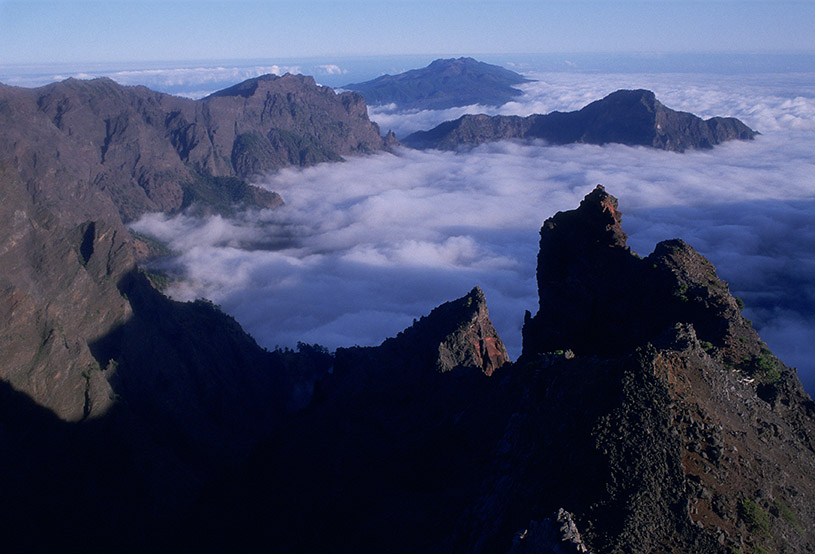 El espectaculo de la Caldera en su parte superior es impresionante. Hay escarpes verticales de 600 a 1.000 de altura.
El espectaculo de la Caldera en su parte superior es impresionante. Hay escarpes verticales de 600 a 1.000 de altura.
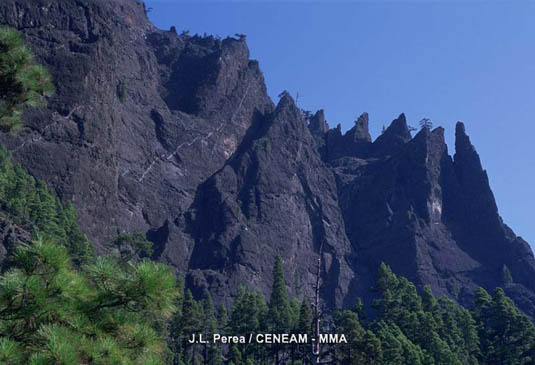 La erosión del agua ha esculpido formas caprichosas como las del Roque de los Frailes o Agujeritos.
La erosión del agua ha esculpido formas caprichosas como las del Roque de los Frailes o Agujeritos.
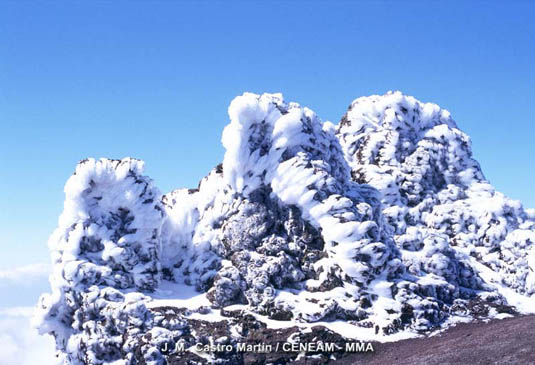 El Roque de los Muchachos, con 2.426 metros de altura, es el punto más elevado de la Palma. Durante el invierno, algunos días, puede aparecer cubierto de hielo.
El Roque de los Muchachos, con 2.426 metros de altura, es el punto más elevado de la Palma. Durante el invierno, algunos días, puede aparecer cubierto de hielo.
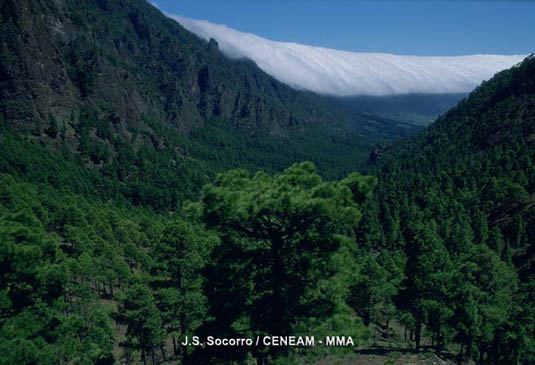 La Caldera de Taburiente posee los pinares de pino canario (Pinus canariensis) mejor conservados de todo el archipìélago.
La Caldera de Taburiente posee los pinares de pino canario (Pinus canariensis) mejor conservados de todo el archipìélago.
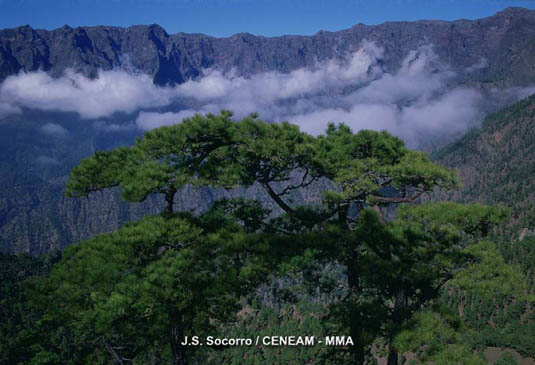 Los pinos canarios (Pinus canariensis) viven en zonas rocosas y resisten muy bien la sequía.
Los pinos canarios (Pinus canariensis) viven en zonas rocosas y resisten muy bien la sequía.
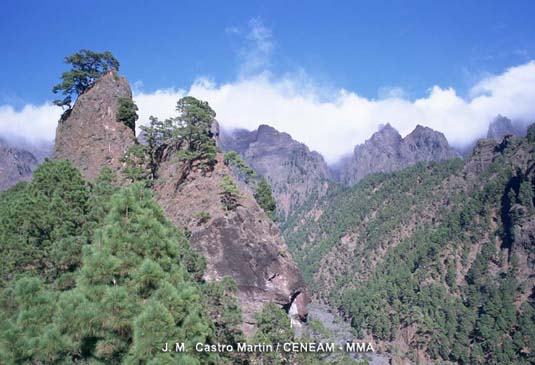 Los roques, junto con los pinares de pino canario, son los elementos del paisaje que mejor definen al Parque Nacional.
Los roques, junto con los pinares de pino canario, son los elementos del paisaje que mejor definen al Parque Nacional.
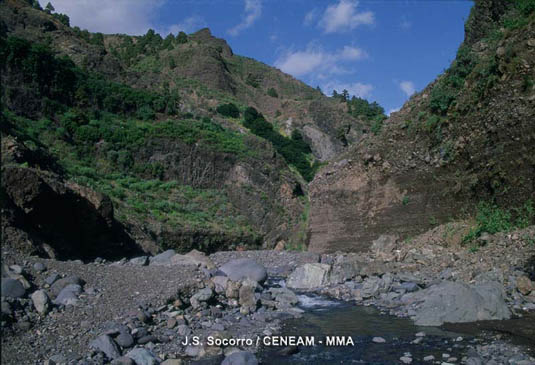 El Barranco de las Angustias, se caracteriza por sus paredes rocosas y escarpadas. Desempeña un importante papel en la formación de suelos y en la captación de agua.
El Barranco de las Angustias, se caracteriza por sus paredes rocosas y escarpadas. Desempeña un importante papel en la formación de suelos y en la captación de agua.
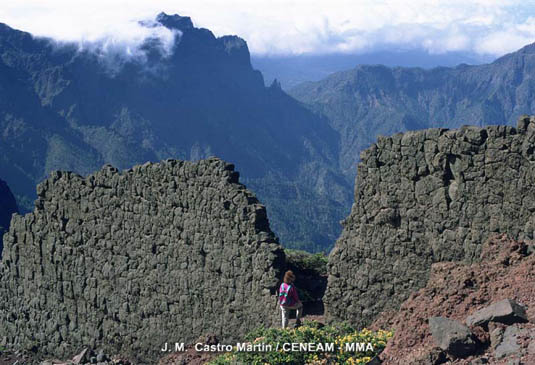 Los diques son antiguas formaciones de lava que rellenaron grietas en el subsuelo, y que la erosión ha dejado al descubierto.
Los diques son antiguas formaciones de lava que rellenaron grietas en el subsuelo, y que la erosión ha dejado al descubierto.
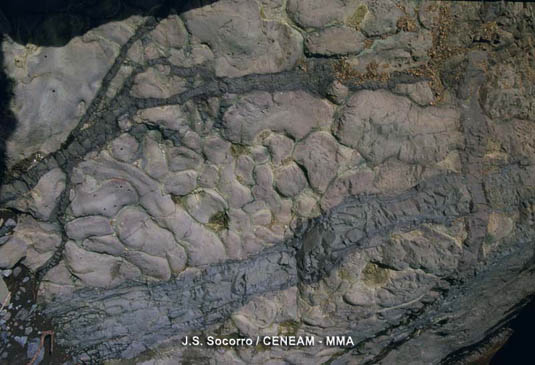 Las rocas que originaron esta isla, proceden de erupciones volcanicas submarinas.
Las rocas que originaron esta isla, proceden de erupciones volcanicas submarinas.
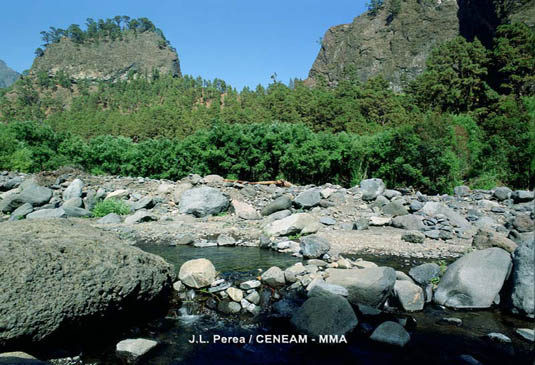 En algunos arroyos de la Caldera de Taburiente, es posible encontrar pequeños bosquetes de sauce canario (Salix canariensis).
En algunos arroyos de la Caldera de Taburiente, es posible encontrar pequeños bosquetes de sauce canario (Salix canariensis).
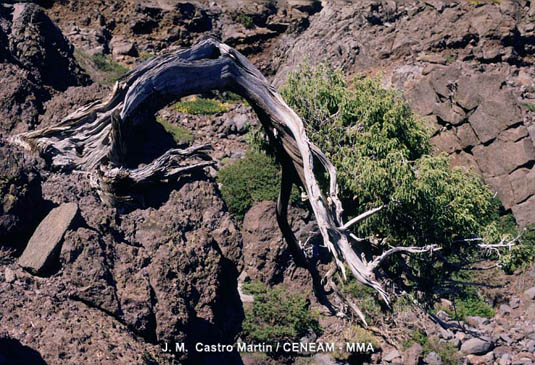 El cedro canario (Juniperus cedrus), es una especie protegida. En el pasado, la extracción de madera y el pastoreo, pusieron a esta especie al borde de la extinción. Actualmente sus poblaciones se están recuperando.
El cedro canario (Juniperus cedrus), es una especie protegida. En el pasado, la extracción de madera y el pastoreo, pusieron a esta especie al borde de la extinción. Actualmente sus poblaciones se están recuperando.
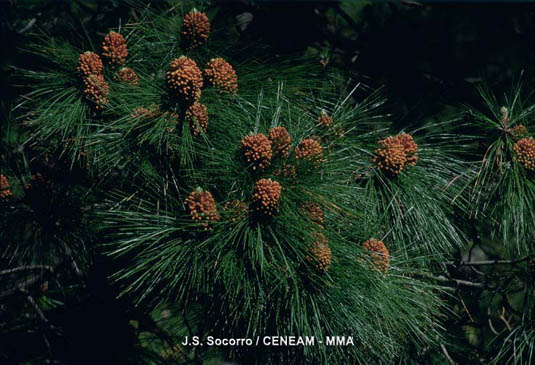 El pino canario (Pinus canariensis) es el único pino español con capacidad para rebrotar despues de los incendios forestales. Esto se considera una adaptación al fuego y la lava de los volcanes.
El pino canario (Pinus canariensis) es el único pino español con capacidad para rebrotar despues de los incendios forestales. Esto se considera una adaptación al fuego y la lava de los volcanes.
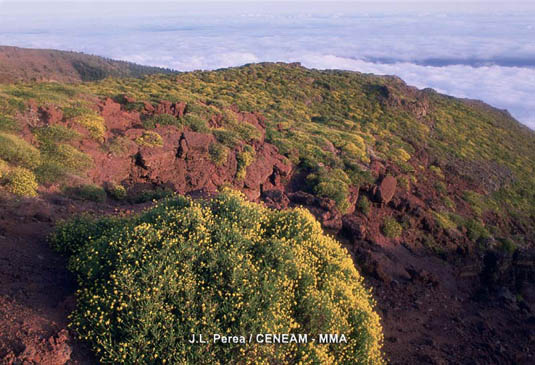 El codeso de cumbre (Adenocarpus viscosus var. spartioides) es un arbusto de alta montaña, que vive en zonas pedregosas.
El codeso de cumbre (Adenocarpus viscosus var. spartioides) es un arbusto de alta montaña, que vive en zonas pedregosas.
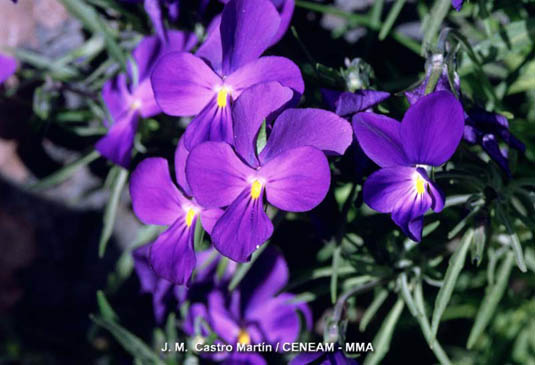 El pensamineto de la cumbre (Viola palmensis) es una planta en peligro de extinción, exclusiva de la isla de La Palma.
El pensamineto de la cumbre (Viola palmensis) es una planta en peligro de extinción, exclusiva de la isla de La Palma.
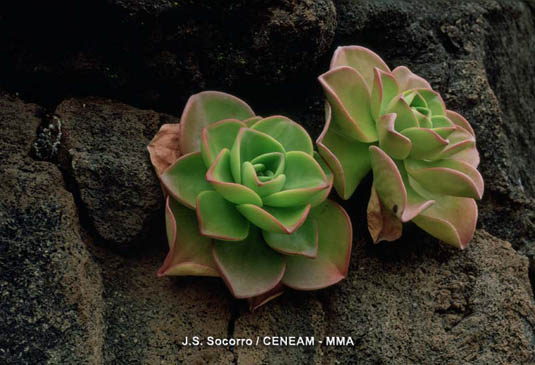 Los bejeques (Aeonium sp.) crecen sobre sustratos rocosos.
Los bejeques (Aeonium sp.) crecen sobre sustratos rocosos.
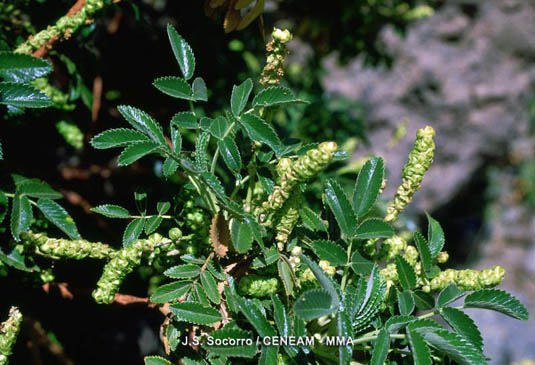 El rosal del guanche (Bencomia exstipulata) es una especie en peligro de extinción, endémica de las islas de Tenerife y La Palma.
El rosal del guanche (Bencomia exstipulata) es una especie en peligro de extinción, endémica de las islas de Tenerife y La Palma.
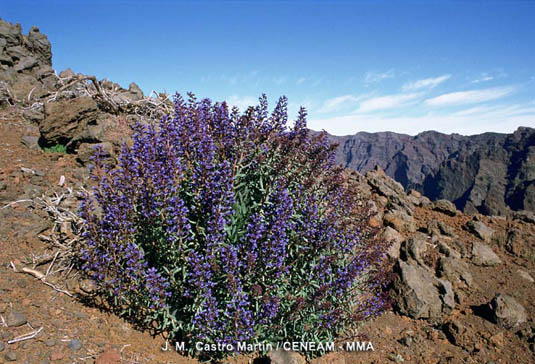 El tajinaste azul genciana (Echium gentianoides), es una planta endémica de la Palma. Vive en los riscos de la Caldera de Taburiente por encima de los 1.000 metros.
El tajinaste azul genciana (Echium gentianoides), es una planta endémica de la Palma. Vive en los riscos de la Caldera de Taburiente por encima de los 1.000 metros.
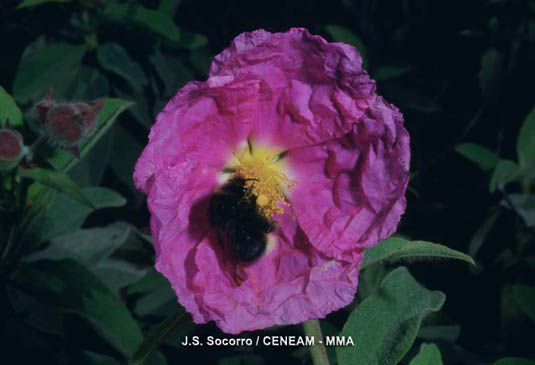 El amagante (Cistus symphytifolius), habita en los claros de los pinares de pino canario.
El amagante (Cistus symphytifolius), habita en los claros de los pinares de pino canario.
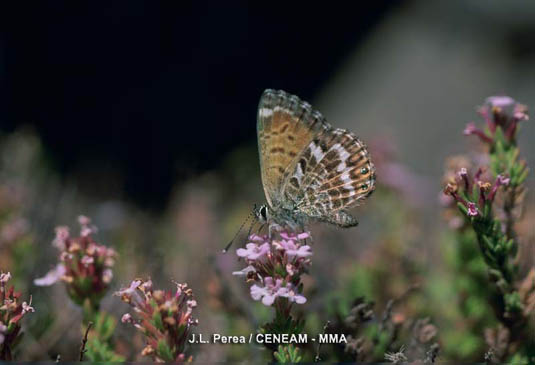 El Manto de Canarias (Cyclyrius webbianus), es una pequeña mariposa, que vive en terrenos abiertos, desde el nivel del mar, hasta las más altas cumbres.
El Manto de Canarias (Cyclyrius webbianus), es una pequeña mariposa, que vive en terrenos abiertos, desde el nivel del mar, hasta las más altas cumbres.
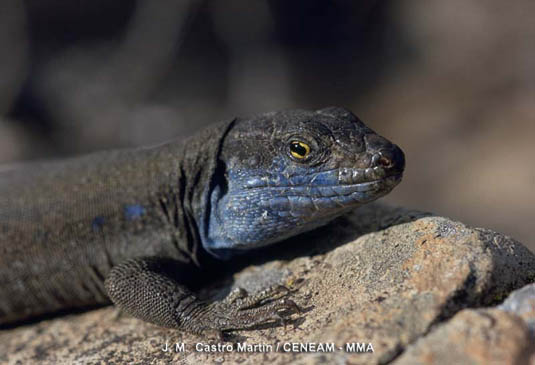 En época de celo se puede ver al lagarto tizón (Gallotia galloti) sobre las rocas mostrando erguido su garganta azulada.
En época de celo se puede ver al lagarto tizón (Gallotia galloti) sobre las rocas mostrando erguido su garganta azulada.
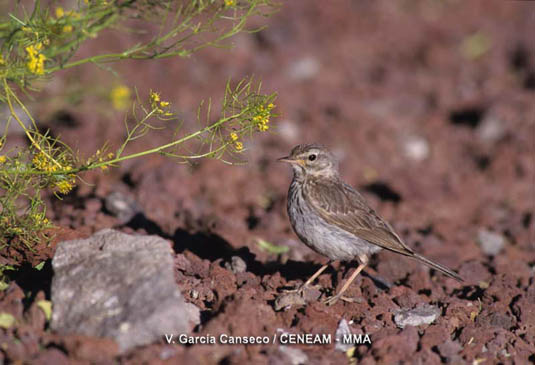 El Bisbita caminero (Anthus berthelotii) es un ave de marcados hábitos terestres, que corre y anda con viveza.
El Bisbita caminero (Anthus berthelotii) es un ave de marcados hábitos terestres, que corre y anda con viveza.
 La graja o chova piquirroja (Phyrrhocorax pyrrhocorax) puede ser observada con facilidad en las zonas altas de la Caldera.
La graja o chova piquirroja (Phyrrhocorax pyrrhocorax) puede ser observada con facilidad en las zonas altas de la Caldera.
 El cernícalo canario (Falco tinnunculus ssp. canriensis), se alimenta fundamentalmente de pajaros pequeños, reptiles e insectos.
El cernícalo canario (Falco tinnunculus ssp. canriensis), se alimenta fundamentalmente de pajaros pequeños, reptiles e insectos.
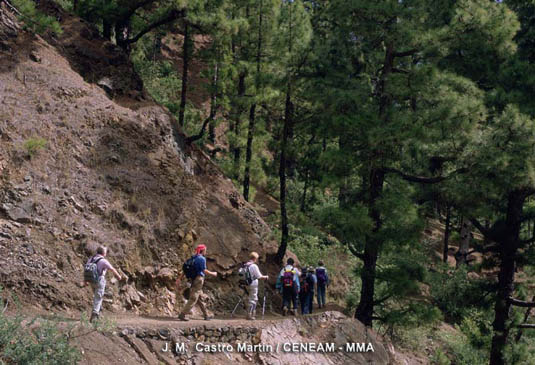 Uso público. La red de senderos del parque permiten descubrir al visitante todos los rincones de este enclave natural.
Uso público. La red de senderos del parque permiten descubrir al visitante todos los rincones de este enclave natural.
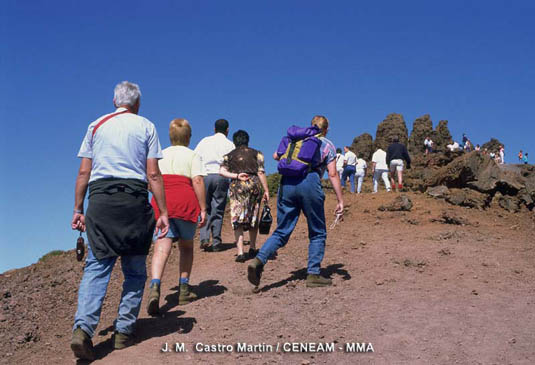 Cada año, numerosos vistantes suben hasta el Roque de los Muchachos.
Cada año, numerosos vistantes suben hasta el Roque de los Muchachos.
This page provides information on cookies we use: We use our own and third-party cookies to keep your session active, personalise your experience, and collect anonymous statistics about how you use this website. You can choose to accept all cookies or select which types you'd like to allow. To learn more about the cookies we use, read our Cookies Policy.
We use two types of cookies on this site. First, there are Functional Cookies, which are essential for the website to work properly. They store session data to make your experience smoother and more convenient. On the other hand, Analytical Cookies collect information about how you use the portal, without personal data, helping us provide a better and more tailored service.
Introduction to the Use of Cookies on the MITECO.gob.es Website
Cookies are small files that are stored on your device when you visit a webpage. They are essential tools that help provide many of the services available on the information society. Among other things, cookies allow a webpage to store and retrieve information about a user's browsing habits or their device. Based on this information, they can be used to recognise the user and enhance the service provided.
Types of Cookies
Depending on the entity that manages the domain from which the cookies are sent and processes the data, there are two types of cookies: first-party cookies and third-party cookies.
There is also a second classification based on how long the cookies remain stored in the user's browser: session cookies and persistent cookies.
Finally, cookies can also be classified into five types based on the purpose for which the data is processed: technical cookies, personalisation cookies, analytics cookies, advertising cookies, and behavioural advertising cookies.
For more information on this, you can refer to the Guide on the use of cookies from the Spanish Data Protection Agency.
Cookies used on the website
The web portal of the Ministry for Ecological Transition and the Demographic Challenge uses Adobe Analytics, an analytics tool that helps website and application owners understand how visitors interact with their content. Adobe Analytics uses a small number of cookies to collect data and generate usage statistics for websites. This information is sent anonymously and is not shared with third parties under any circumstances. You can choose to accept or reject these cookies, as they do not affect the portal’s functionality. However, they help provide valuable information that allows us to offer a better and more tailored service. For more information about Adobe Analytics cookies and privacy, please refer to the following links:
Additionally, pages featuring content from social network X will only set cookies if the user is logged into the X site. For more details on these cookies, please refer to the following link: Privacy on Social Network X
Finally, a technical cookie named MITECO-compliance is stored, which is a first-party, technical, and session-based cookie. It manages user consent for the use of cookies on the website, remembering which users have accepted them and which have not, ensuring that those who have accepted are not shown cookie consent messages at the top of the page. This cookie is essential for the proper functioning of the portal.
Cookies Policy Acceptance / Rejection
The Ministry for Ecological Transition and the Demographic Challenge gives you the option to accept or reject cookies that are not essential for the portal's operation. Upon accessing the portal, a message will be displayed in the centre of the page with information about the cookie policy and the following options:
· Firefox
· Chrome
· Safari